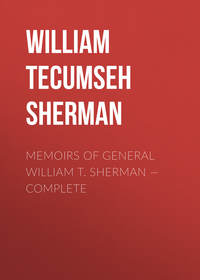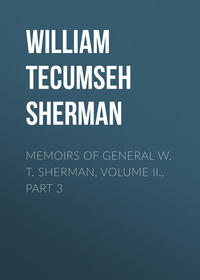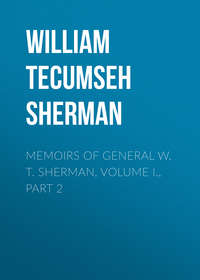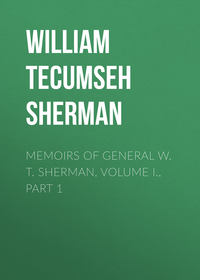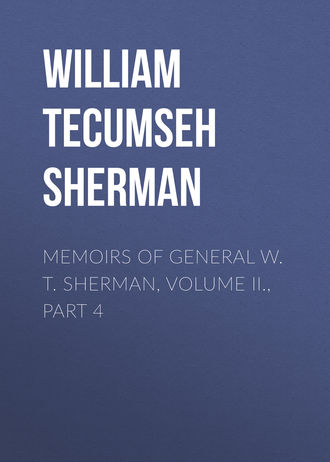 полная версия
полная версияMemoirs of General W. T. Sherman, Volume II., Part 4
COX'S BRIGADE, NEUSE RIVER, NORTH CAROLINA, March 22, 1865
Lieutenant-General U. S. GRANT, Commander-in-Chief, City Point, Virginia.
GENERAL: I wrote you from Fayetteville, North Carolina, on Tuesday, the 14th instant, that I was all ready to start for Goldsboro', to which point I had also ordered General Schofield, from Newborn, and General Terry, from Wilmington. I knew that General Jos. Johnston was supreme in command against me, and that he would have time to concentrate a respectable army to oppose the last stage of this march. Accordingly, General Slocum was ordered to send his main supply-train, under escort of two divisions, straight for Bentonsville, while he, with his other four divisions, disencumbered of all unnecessary wagons, should march toward Raleigh, by way of threat, as far as Averysboro'. General Howard, in like manner, sent his trains with the Seventeenth Corps, well to the right, and, with the four divisions of the Fifteenth Corps, took roads which would enable him to come promptly to the exposed left flank. We started on the 16th, but again the rains set in, and the roads, already bad enough, became horrible.
On Tuesday, the 16th, General Slocum found Hardee's army, from Charleston, which had retreated before us from Cheraw, in position across the narrow, swampy neck between Cape Fear and North Rivers, where the road branches off to Goldsboro'. There a pretty severe fight occurred, in which General Slocum's troops carried handsomely the advanced line, held by a South Carolina brigade, commanded by a Colonel Butler. Its Commander, Colonel Rhett, of Fort Sumter notoriety, with one of his staff, had the night before been captured, by Kilpatrick's scouts, from his very skirmish-line. The next morning Hardee was found gone, and was pursued through and beyond Averysboro'. General Slocum buried one hundred and eight dead rebels, and captured and destroyed three guns. Some eighty wounded rebels were left in our hands, and, after dressing their wounds, we left them in a house, attended by a Confederate officer and four privates, detailed out of our prisoners and paroled for the purpose.
We resumed the march toward Goldsboro'. I was with the left wing until I supposed all danger had passed; but, when General Slocum's head of column was within four miles of Bentonsville, after skirmishing as usual with cavalry, he became aware that there was infantry in his front. He deployed a couple of brigades, which, on advancing, sustained a partial repulse, but soon rallied, when he formed a line of the two leading divisions (Morgan's and Carlin's) of Jeff. C. Davis's corps. The enemy attacked these with violence, but was repulsed. This was in the forenoon of Sunday, the 19th. General Slocum brought forward the two divisions of the Twentieth Corps, hastily disposed of them for defense, and General Kilpatrick massed his cavalry on the left.
General Jos. Johnston had, the night before, marched his whole army (Bragg, Cheatham, S. D. Lee, Hardee, and all the troops he had drawn from every quarter), determined, as he told his men, to crash one of our corps, and then defeat us in detail. He attacked General Slocum in position from 3 P. M. on the 19th till dark; but was everywhere repulsed, and lost heavily. At the time, I was with the Fifteenth Corps, marching on a road more to the right; but, on hearing of General Slocum's danger, directed that corps toward Cox's Bridge, in the night brought Blair's corps over, and on the 20th marched rapidly on Johnston's flank and rear. We struck him about noon, forced him to assume the defensive, and to fortify. Yesterday we pushed him hard, and came very near crushing him, the right division of the Seventeenth Corps (Mower's) having broken in to within a hundred yards of where Johnston himself was, at the bridge across Mill Creek. Last night he retreated, leaving us in possession of the field, dead, and wounded. We have over two thousand prisoners from this affair and the one at Averysboro', and I am satisfied that Johnston's army was so roughly handled yesterday that we could march right on to Raleigh; but we have now been out six weeks, living precariously upon the collections of our foragers, our men dirty, ragged, and saucy, and we must rest and fix up a little. Our entire losses thus far (killed, wounded, and prisoners) will be covered by twenty-five hundred, a great part of which are, as usual, slight wounds. The enemy has lost more than double as many, and we have in prisoners alone full two thousand.
I limited the pursuit, this morning, to Mill Creek, and will forthwith march the army to Goldsboro', there to rest, reclothe, and get some rations.
Our combinations were such that General Schofield entered Goldsboro' from Newborn; General Terry got Cox's Bridge, with pontoons laid, and a brigade across Neuse River intrenched; and we whipped Jos. Johnston–all on the same day.
After riding over the field of battle to-day, near Bentonsville, and making the necessary orders, I have ridden down to this place (Cox's Bridge) to see General Terry, and to-morrow shall ride into Goldsboro.
I propose to collect there my army proper; shall post General Terry about Faison's Depot, and General Schofield about Kinston, partly to protect the road, but more to collect such food and forage as the country affords, until the railroads are repaired leading into Goldsboro'.
I fear these have not been pushed with the vigor I had expected; but I will soon have them both going. I shall proceed at once to organize three armies of twenty-five thousand men each, and will try and be all ready to march to Raleigh or Weldon, as we may determine, by or before April 10th.
I inclose you a copy of my orders of to-day. I would like to be more specific, but have not the data. We have lost no general officers nor any organization. General Slocum took three guns at Averysboro', and lost three others at the first dash on him at Bentonsville. We have all our wagons and trains in good order.
Yours truly,
W. T. SHERMAN, Major-General.
HEADQUARTERS MILITARY DIVISION OF THE MISSISSIPPI IN THE FIELD,
COX'S BRIGADE, GOLDSBORO', NORTH CAROLINA, March 23, 1865.
Lieutenant-General U. S. GRANT, commanding the Armies of the United States, City Point, Virginia.
GENERAL: On reaching Goldsboro' this morning, I found Lieutenant Dunn awaiting me with your letter of March 18th and dispatch of the 17th. I wrote you fully from Cox's Bridge yesterday, and since reaching Goldsboro' have learned that my letter was sent punctually to Newborn, whence it will be dispatched to you.
I am very glad to hear that General Sheridan did such good service between Richmond and Lynchburg, and hope he will keep the ball moving, I know that these raids and dashes disconcert our enemy and discourage him much.
General Slocum's two corps (Fourteenth and Twentieth) are now coming in. I will dispose of them north of Goldsboro', between the Weldon road and Little River. General Howard to-day is marching south of the Nenae, and to-morrow will come in and occupy ground north of Goldsboro', extending from the Weldon Railroad to that leading to Kinston.
I have ordered all the provisional divisions, made up of troops belonging to the regular corps, to be broken up, and the men to join their proper regiments and organizations; and have ordered General Schofield to guard the railroads back to Newborn and Wilmington, and to make up a movable column equal to twenty-five thousand men, with which to take the field. His army will be the centre, as on the Atlanta campaign. I do not think I want any more troops (other than absentees and recruits) to fill up the present regiments, and I can make up an army of eighty thousand men by April 10th. I will post General Kilpatrick at Mount Olive Station on the Wilmington road, and then allow the army some rest.
We have sent all our empty wagons, under escort, with the proper staff-officers, to bring up from Kinston clothing and provisions. As long as we move we can gather food and forage; but, the moment we stop, trouble begins.
I feel sadly disappointed that our railroads are not done. I do not like to say there has been any neglect until I make inquiries; but it does seem to me the repairs should have been made ere this, and the road properly stocked. I can only hear of one locomotive (besides the four old ones) on the Newbern road, and two damaged locomotives (found by General Terry) on the Wilmington road. I left Generals Easton and Beckwith purposely to make arrangements in anticipation of my arrival, and have heard from neither, though I suppose them both to be at Morehead City.
At all events, we have now made a junction of all the armies, and if we can maintain them, will, in a short time, be in a position to march against Raleigh, Gaston, Weldon, or even Richmond, as you may determine.
If I get the troops all well planed, and the supplies working well, I may run up to see you for a day or two before diving again into the bowels of the country.
I will make, in a very short time, accurate reports of our operations for the past two months. Yours truly,
W. T. SHERMAN, Major-General commanding.
HEADQUARTERS MILITARY DIVISION OF THE MISSISSIPPI IN THE FIELD,
COX'S BRIGADE, GOLDSBORO', NORTH CAROLINA, March 24, 1865.
Lieutenant-General U. S. GRANT, City Point, Virginia.
GENERAL: I have kept Lieutenant Dunn over to-day that I might report farther. All the army is now in, save the cavalry (which I have posted at Mount Olive Station, south of the Nenae) and General Terry's command (which–to-morrow will move from Cog's Ferry to Faison's Depot, also on the Wilmington road). I send you a copy of my orders of this morning, the operation of which will, I think, soon complete our roads. The telegraph is now done to Morehead City, and by it I learn that stores have been sent to Kinston in boats, and that our wagons are loading with rations and clothing. By using the Neuse as high up as Kinston, hauling from there twenty-six miles, and by equipping the two roads to Morehead City and Wilmington, I feel certain we can not only feed and equip the army, but in a short time fill our wagons for another start. I feel certain, from the character of the fighting, that we have got Johnston's army afraid of us. He himself acts with timidity and caution. His cavalry alone manifests spirit, but limits its operations to our stragglers and foraging-parties. My marching columns of infantry do not pay the cavalry any attention, but walk right through it.
I think I see pretty clearly how, in one more move, we can checkmate Lee, forcing him to unite Johnston with him in the defense of Richmond, or to abandon the cause. I feel certain, if he leaves Richmond, Virginia leaves the Confederacy. I will study my maps a little more before giving my positive views. I want all possible information of the Roanoke as to navigability, how far up, and with what draught.
We find the country sandy, dry, with good roads, and more corn and forage than I had expected. The families remain, but I will gradually push them all out to Raleigh or Wilmington. We will need every house in the town. Lieutenant Dunn can tell you of many things of which I need not write. Yours truly,
W. T. SHERMAN, Major-General.
HEADQUARTERS MILITARY DIVISION OF THE MISSISSIPPI IN THE FIELD,
COX'S BRIGADE, GOLDSBORO', NORTH CAROLINA, April 5,1865
Major-General George H. Thomas, commanding Department of the Cumberland.
DEAR GENERAL: I can hardly help smiling when I contemplate my command–it is decidedly mixed. I believe, but am not certain, that you are in my jurisdiction, but I certainly cannot help you in the way of orders or men; nor do I think you need either. General Cruft has just arrived with his provisional division, which will at once be broken up and the men sent to their proper regiments, as that of Meagher was on my arrival here.
You may have some feeling about my asking that General Slocum should have command of the two corps that properly belong to you, viz., the Fourteenth and Twentieth, but you can recall that he was but a corps commander, and could not legally make orders of discharge, transfer, etc., which was imperatively necessary. I therefore asked that General Slocum should be assigned to command "an army in the field," called the Army of Georgia, composed of the Fourteenth and Twentieth Corps. The order is not yet made by the President, though I have recognized it because both, General Grant and the President have sanctioned it, and promised to have the order made.
My army is now here, pretty well clad and provided, divided into three parts, of two corps each–much as our old Atlanta army was.
I expect to move on in a few days, and propose (if Lee remains in Richmond) to pass the Roanoke, and open communication with the Chowan and Norfolk. This will bring me in direct communication with General Grant.
This is an admirable point–country open, and the two railroads in good order back to Wilmington and Beaufort. We have already brought up stores enough to fill our wagons, and only await some few articles, and the arrival of some men who are marching up from the coast, to be off.
General Grant explained to me his orders to you, which, of course, are all right. You can make reports direct to Washington or to General Grant, but keep me advised occasionally of the general state of affairs, that I may know what is happening. I must give my undivided attention to matters here. You will hear from a thousand sources pretty fair accounts of our next march. Yours truly,
W. T. SHERMAN, Major-General.
[LETTER FROM ADMIRAL DAHLGREN]
SOUTH ATLANTIC SQUADRON
FLAG-SHIP PHILADELPHIA, CHARLESTON, April 20, 1865
Major-General W. T. SHERMAN, commanding Armies of the Tennessee, Georgia, and Mississippi.
Mr DEAR GENERAL: I was much gratified by a sight of your handwriting, which has just reached me from Goldsboro'; it was very suggestive of a past to me, when these regions were the scene of your operations.
As you progressed through South Carolina, there was no manifestation of weakness or of an intention to abandon Charleston, until within a few hours of the fact. On the 11th of February I was at Stono, and a spirited demonstration was made by General Schimmel-pfennig and the vessels. He drove the rebels from their rifle-pits in front of the lines, extending from Fort Pringle, and pushed them vigorously. The next day I was at Bull's Bay, with a dozen steamers, among them the finest of the squadron. General Potter had twelve to fifteen hundred men, the object being to carry out your views. We made as much fuss as possible, and with better success than I anticipated, for it seems that the rebs conceived Stono to be a feint, and the real object at Bull's Bay, supposing, from the number of steamers and boats, that we had several thousand men. Now came an aide from General Gillmore, at Port Royal, with your cipher-dispatch from Midway, so I steamed down to Port Royal to see him. Next day was spent in vain efforts to decipher-finally it was accomplished. You thought that the state of the roads might force you to turn upon Charleston; so I went there on the 15th, but there was no sign yet of flinching. Then I went to Bull's Bay next day (16th), and found that the troops were not yet ashore, owing to the difficulties of shoal water. One of the gunboats had contrived to get up to within shelling range, and both soldiers and sailors were working hard. On the evening of the 18th I steamed down to Stono to see how matters were going there. Passing Charleston, I noticed two large fires, well inside–probably preparing to leave. On the 17th, in Stono, rumors were flying about loose of evacuation. In course of the morning, General Schimmelpfennig telegraphed me, from Morris Island, that there were symptoms of leaving; that he would again make a push at Stono, and asked for monitors. General Schimmelpfennig came down in the afternoon, and we met in the Folly Branch, near Secessionville. He was sore that the rebs would be off that night, so he was to assault them in front, while a monitor and gunboats stung their flanks both sides. I also sent an aide to order my battery of five eleven-inch guns, at Cumming's Point, to fire steadily all night on Sullivan's Island, and two monitors to close up to the island for the same object. Next morning (18th) the rascals were found to be off, and we broke in from all directions, by land and water. The main bodies had left at eight or nine in the evening, leaving detachments to keep up a fire from the batteries. I steamed round quickly, and soon got into the city, threading the streets with a large group of naval captains who had joined me. All was silent as the grave. No one to be seen but a few firemen.
No one can question the excellence of your judgment in taking the track you did, and I never had any misgivings, but it was natural to desire to go into the place with a strong hand, for, if any one spot in the land was foremost in the trouble, it was Charleston.
Your campaign was the final blow, grand in conception, complete in execution; and now it is yours to secure the last army which rebeldom possesses. I hear of your being in motion by the 9th, and hope that the result may be all that you wish.
Tidings of the murder of the President have just come, and shocked every mind. Can it be that such a resort finds root in any stratum of American opinion? Evidently it has not been the act of one man, nor of a madman. Who have prompted him?
I am grateful for your remembrance of my boy; the thought of him is ever nearest to my heart. Generous, brave, and noble, as I ever knew him to be, that he should close his young life so early, even under the accepted conditions of a soldier's life, as a son of the Union, would have been grief sufficient for me to bear; but that his precious remains should have been so treated by the brutes into whose hands they fell, adds even to the bitterness of death. I am now awaiting the hour when I can pay my last duties to his memory.
With my best and sincere wishes, my dear general, for your success and happiness, I am, most truly, your friend,
J. A. DAHLGREN.
[General Order No. 50.]
WAR DEPARTMENT, ADJUTANT-GENERAL'S OFFICE
WASHINGTON, March 27, 1865
Ordered–1. That at the hour of noon, on the 14th day of April, 1885, Brevet Major-General Anderson will raise and plant upon the ruins of Fort Sumter, in Charleston Harbor, the same United States flag which floated over the battlements of that fort during the rebel assault, and which was lowered and saluted by him and the small force of his command when the works were evacuated on the 14th day of April, 1861.
2. That the flag, when raised, be saluted by one hundred guns from Fort Sumter, and by a national salute from every fort and rebel battery that fired upon Fort Sumter.
3. That suitable ceremonies be had upon the occasion, under the direction of Major-General William T. Sherman, whose military operations compelled the rebels to evacuate Charleston, or, in his absence, under the charge of Major-General Q. A. Gilmore, commanding the department. Among the ceremonies will be the delivery of a public address by the Rev. Henry Ward Beecher.
4. That the naval forces at Charleston, and their commander on that station, be invited to participate in the ceremonies of the occasion.
By order of the President of the United States,
EDWIN M. STANTON, Secretary of War.
[General Order No. 41.]
HEADQUARTERS DEPARTMENT OF THE SOUTH
HILTON HEAD, SOUTH CAROLINA, April 10, 1865
Friday next, the 14th inst., will be the fourth anniversary of the capture of Fort Sumter by the rebels. A befitting celebration on that day, in honor of its reoccupation by the national forces, has been ordered by the President, in pursuance of which Brevet Major-General Robert Anderson, United States Army, will restore to its original place on the fort the identical flag which, after an honorable and gallant defense, he was compelled to lower to the insurgents in South Carolina, in April, 1861.
The ceremonies for the occasion will commence with prayer, at thirty minutes past eleven o'clock a.m.
At noon precisely, the flag will be raised and saluted with one hundred guns from Fort Sumter, and with a national salute from Fort Moultrie and Battery Bee on Sullivan's Island, Fort Putnam on Morris Island, and Fort Johnson on James's Island; it being eminently appropriate that the places which were so conspicuous in the inauguration of the rebellion should take a part not less prominent in this national rejoicing over the restoration of the national authority.
After the salutes, the Rev. Henry Ward Beecher will deliver an address.
The ceremonies will close with prayer and a benediction.
Colonel Stewart L. Woodford, chief of staff, under such verbal instructions as he may receive, is hereby charged with the details of the celebration, comprising all the arrangements that it may be necessary to make for the accommodation of the orator of the day, and the comfort and safety of the invited guests from the army and navy, and from civil life.
By command of Major-General Q. A. Gillmore,
W. L. M. BURGER, Assistant Adjutant-General.
Copy of Major ANDERSON's Dispatch, announcing the Surrender of Fort Sumter, April 14, 1861.
STEAMSHIP BALTIC, OFF SANDY HOOK
April 10, 1861, 10.30 a.m. via New York
Honorable S. Cameron, Secretary of War, Washington
Having defended Fort Sumter for thirty-four hours, until the quarters were entirely burned, the main gates destroyed by fire, the gorge-walls seriously injured, the magazine surrounded by flames, and its door closed from the effect of heat, four barrels and three cartridges of powder only being available, and no provisions remaining but pork, I accepted terms of evacuation offered by General Beauregard, being the same offered by him on the 11th inst., prior to the commencement of hostilities, and marched out of the fort, Sunday afternoon, the 14th inst., with colors flying and drums beating, bringing away company and private property, and saluting my flag with fifty guns.
ROBERT ANDERSON, Major First Artillery, commanding.
CHAPTER XXIV
END OF THE WAR–FROM GOLDSBORO' TO RALEIGH AND WASHINGTONAPRIL AND MAY, 1865
As before described, the armies commanded respectively by Generals J. M. Schofield, A. H. Terry, and myself, effected a junction in and about Goldsboro', North Carolina, during the 22d and 23d of March, 1865, but it required a few days for all the troops and trains of wagons to reach their respective camps. In person I reached Goldsboro' on the 23d, and met General Schofield, who described fully his operations in North Carolina up to that date; and I also found Lieutenant Dunn, aide-de-camp to General Grant, with a letter from him of March 16th, giving a general description of the state of facts about City Point. The next day I received another letter, more full, dated the 22d, which I give herewith.
Nevertheless, I deemed it of great importance that I should have a personal interview with the general, and determined to go in person to City Point as soon as the repairs of the railroad, then in progress under the personal direction of Colonel W. W. Wright, would permit:
HEADQUARTERS OF THE ARMIES OF THE UNITED STATES VCITY POINT, VIRGINIA, March 22, 1865
Major-General SHERMAN, Commanding Military Division of the Mississippi.
GENERAL: Although the Richmond papers do not communicate the fact, yet I saw enough in them to satisfy me that you occupied Goldsboro' on the 19th inst. I congratulate you and the army on what may be regarded as the successful termination of the third campaign since leaving the Tennessee River, less than one year ago.
Since Sheridan's very successful raid north of the James, the enemy are left dependent on the Southside and Danville roads for all their supplies. These I hope to cut next week. Sheridan is at White House, "shoeing up" and resting his cavalry. I expect him to finish by Friday night and to start the following morning, raid Long Bridge, Newmarket, Bermuda Hundred, and the extreme left of the army around Petersburg. He will make no halt with the armies operating here, but will be joined by a division of cavalry, five thousand five hundred strong, from the Army of the Potomac, and will proceed directly to the Southside and Danville roads. His instructions will be to strike the Southside road as near Petersburg as he can, and destroy it so that it cannot be repaired for three or four days, and push on to the Danville road, as near to the Appomattox as he can get. Then I want him to destroy the road toward Burkesville as far as he can; then push on to the Southside road, west of Burkesville, and destroy it effectually. From that point I shall probably leave it to his discretion either to return to this army, crossing the Danville road south of Burkesville, or go and join you, passing between Danville and Greensboro'. When this movement commences I shall move out by my left, with all the force I can, holding present intrenched lines. I shall start with no distinct view, further than holding Lee's forces from following Sheridan. But I shall be along myself, and will take advantage of any thing that turns up. If Lee detaches, I will attack; or if he comes out of his lines I will endeavor to repulse him, and follow it up to the best advantage.


